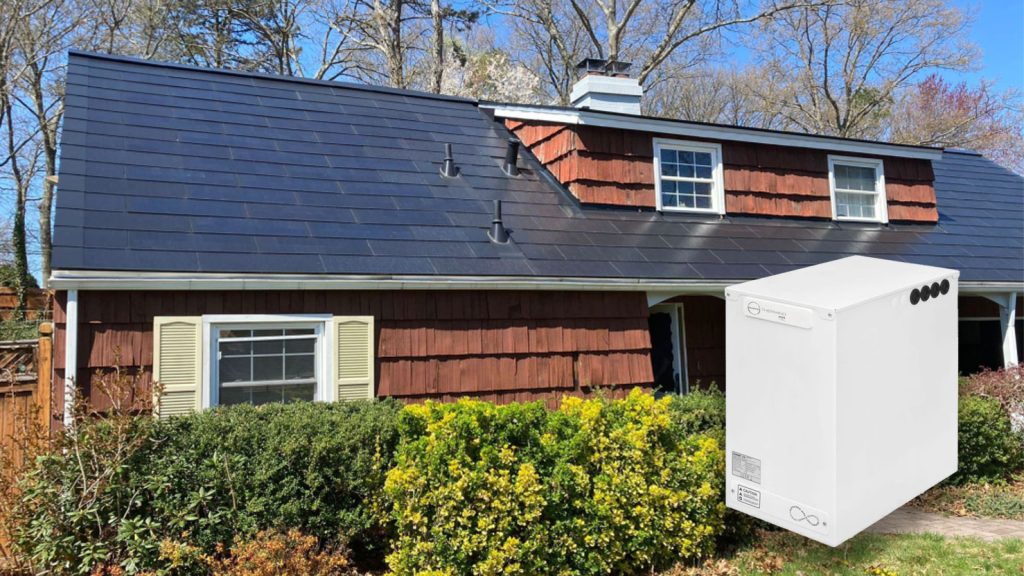Project Overview:
One such project is located in Farmingville, NY, where a single-household of four people is upgrading their system. The home previously relied on an oil-fired boiler for domestic hot water, and the project’s goal is to replace oil consumption by harnessing the energy produced by an existing solar PV system to generate clean, renewable hot water.
Problems to be addressed:
The home’s reliance on an oil-fired boiler resulted in high energy costs and significant greenhouse gas emissions. By switching to a Sunamp thermal battery paired with an existing solar PV system, the project reduces fossil fuel dependence and lowers the home’s carbon footprint. The outdated oil boiler was also inefficient, and the solar energy potential was not being fully utilized. The thermal battery optimizes energy use, harnessing solar power for domestic hot water and improving overall energy efficiency. Additionally, the oil system’s high carbon emissions are eliminated with the clean, renewable energy solution, contributing to decarbonization and promoting a more sustainable future.
Existing System Overview:
The home currently uses an oil-fired boiler paired with an oil tank to provide domestic hot water. In addition, the property is equipped with a solar PV system installed on the roof, along with a SPAN® smart electrical panel for enhanced energy management. Despite the solar system, the oil boiler remains the primary source for hot water, limiting the home’s ability to fully leverage renewable energy for its heating needs.
The Sunamp Solution:
The Sunamp Thermino 80e (P58) thermal battery will replace the existing oil-fired boiler, providing both domestic hot water and heating. The battery will be charged using an integrated 2.8 kW electric resistance heater, which is powered by the solar panels installed on the property. This solution ensures the home can fully utilize renewable energy for hot water production while reducing dependence on fossil fuels.
Results and Findings
Power Consumption and Solar Optimization:
Thermal battery charging events occurred midday on both weekdays and weekends, aligning with peak solar production. This demonstrated the thermal battery’s effectiveness in shifting the hot water heating load, maximizing the use of solar energy and reducing reliance on external power sources.
This result shows that the thermal battery is an effective water heating solution when powered by solar PV in an electrification retrofit. The thermal battery played a crucial role in supporting the use of renewable energy, proving its value as a sustainable system component in reducing fossil fuel reliance.
Impact & Conclusion: Enhancing Energy Efficiency and Sustainability
Solar Optimization:
The thermal battery effectively harnessed solar PV as its primary power source, shifting peak power demand to align with solar production. This eliminated 100% of oil consumption for domestic hot water while consistently maintaining optimal water temperatures.
Cutting Emissions & Costs:
Previously, the home’s oil-fired water heating system consumed approximately 200 gallons of fuel annually, resulting in 0.67 tons of CO2e emissions per year. In comparison, if powered by a grid-connected battery, the emissions would be only 0.35 tons of CO2e annually, highlighting a significant environmental benefit.
This project demonstrates the potential of phase change material thermal batteries in advancing building electrification, integrating renewable energy, and achieving emission reduction goals.
NYSERDA NEXTGEN Building Innovation Program:
The NYSERDA (New York State Energy Research & Development Authority) NEXTGEN Building Innovation program aims to help New York State achieve a carbon-neutral economy by 2050, with a goal of reducing greenhouse gas emissions by at least 85% from 1990 levels.
The NYSERDA NextGen Buildings program is dedicated to accelerating the development and commercialization of innovative technologies that enable the electrification and decarbonization of New York State’s building stock. By supporting the adoption of cutting-edge building innovations, the program seeks to make buildings cleaner, more energy-efficient, load-flexible, and resilient in the face of climate change.
As part of this initiative, Sunamp is deploying thermal batteries at eight different sites across the state, integrating these systems with both existing and new infrastructure to deliver domestic hot water and heating in a cleaner, more energy-efficient manner.


